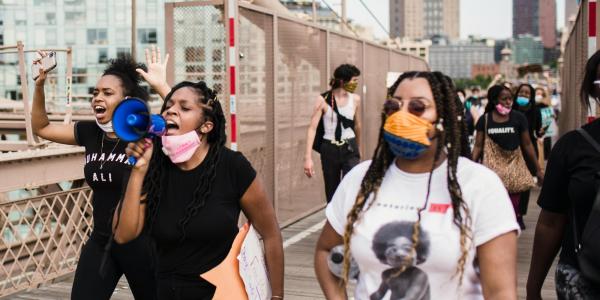Among the high-profile decisions the U.S. Supreme Court handed down last week was the 303 Creative case, in which the court ruled in favor of a web designer in Colorado who refuses to create messages that celebrate same-sex weddings out of religious objections.
The court’s 6-3 decision marks a significant blow to LGBTQ+ protections. Justices grounded the ruling in protections for free speech. The ruling will affect businesses that trade in so-called “expressive” goods.
CU Boulder Today interviewed CU Boulder Law Professor Scott Skinner-Thompson, who focuses on LGBTQ+ and HIV legal issues, on the application of the First Amendment and the ruling’s legal implications for LGBTQ+ rights.
What can businesses do or not do under this ruling?
Even the majority opinion authored by Justice Neil Gorsuch says that generally speaking, these kinds of public accommodation nondiscrimination laws are unexceptional. And they're part of a long, proud history of protecting people in the marketplace. On the other hand, the majority also suggests that if you can prove that your business is expressive in some way, then you're more likely to be able to fall into this newly created exception to anti-discrimination law and say, ‘Well, I'm exempt because what I do is expressive.’ Going forward we're going to see lots of businesses try to say that they are expressive and therefore don't have to comply with nondiscrimination.
How does that affect the LGBTQ+ community?
Justice Sonia Sotomayor summarized it really powerfully. These (non-discrimination) laws do two things: They guarantee equal access to a product and they communicate and prevent dignitary harms to minoritized groups. There are going to be instances where people in conservative, smaller markets are going to be denied access to services. But even if you are a queer person living in metro Denver and can find a business that will serve you, knowing that a business does not have an obligation to and can openly signal their unwillingness to do so inflicts a dignitary harm on you separate and apart from any unequal access.
How does the definition of ‘expressive’ change with this ruling?
It's a really critical question and there's going to be more and more incentive to cast what a business is doing as expressive. While generally speaking queer people benefit from a broad definition of what counts as expressive because that in turn can protect our expressive identities, in this case the court focused too much on whether the underlying activity was expressive rather than whether the law targeted that expression. As Justice Sotomayor noted, the law didn’t target expression–it was a neutral, generally applicable law that incidentally burdened expression.
People are comparing this to the Masterpiece Cake Shop decision from a few years ago. Do you see similarities?
They're very similar. Five years ago, Masterpiece dealt with cake baking for a wedding as opposed to a wedding website. But the court in that case in large part punted and said that the application in that instance was unconstitutional because of some rhetoric they glommed onto from the state commission that they perceived as anti-religious. But we're dealing with the same statute and similar principles of freedom of expression and/or religion. However, in that instance, a majority of the court seemed to suggest that these kinds of laws generally were unremarkable. And you see both the dissent and the majority from 303 Creative trumpeting that language from Masterpiece in this case.
How can people who want to be LGBTQ+ allies push for change at this point?
This is a time when, despite some measure of progress for some within the queer community, there are incredible attacks on the lives of queer people, in particular trans people, going on. On an individual level, reaching out to those in your orbit who are queer to express solidarity is a great place to start. Also, engagement with civil society to try to change these laws and judicial interpretations is going to be critical.
Could this ruling apply to other groups?
This decision is not limited to queer people. If you think the application of anti-discrimination law is going to force you to express something you don't believe in, like, for instance, interracial marriage, that becomes a possible exception, right? So we're going to see greater segregation within the marketplace. I do think this is a step back. I also think it's really important to affirm that it is still illegal in Colorado for businesses to discriminate against gay people.
CU Boulder Today regularly publishes Q&As with our faculty members weighing in on news topics through the lens of their scholarly expertise and research/creative work. The responses here reflect the knowledge and interpretations of the expert and should not be considered the university position on the issue. All publication content is subject to edits for clarity, brevity and university style guidelines.



